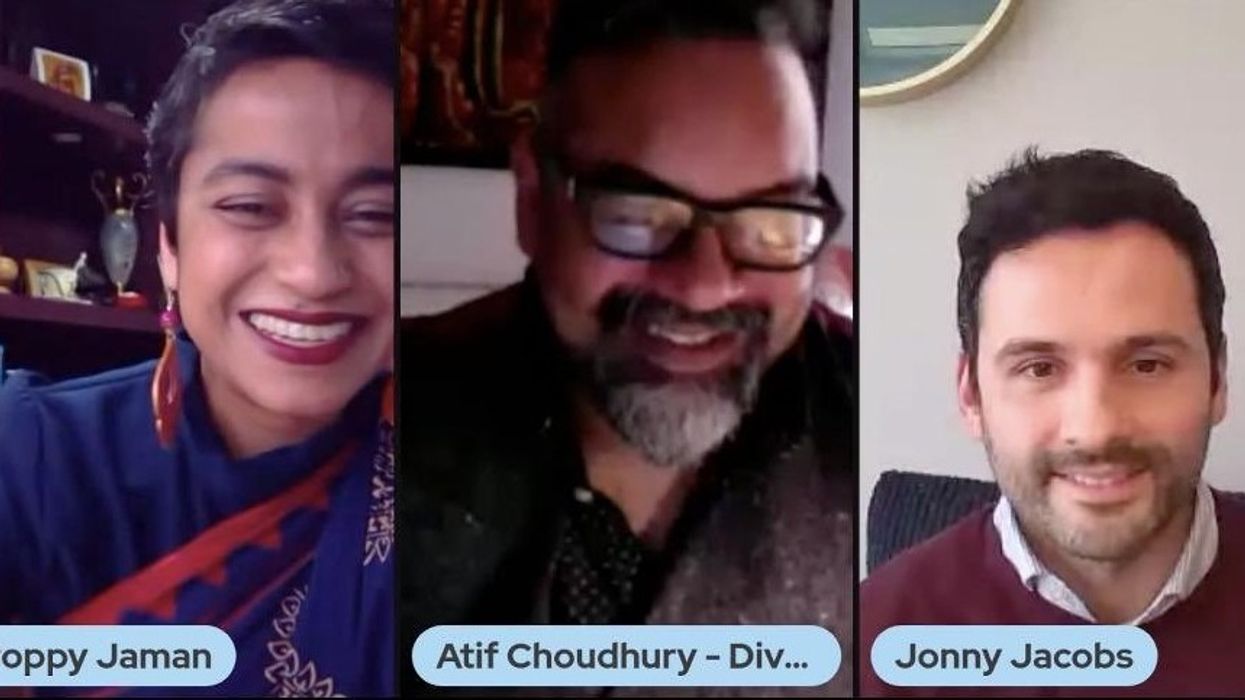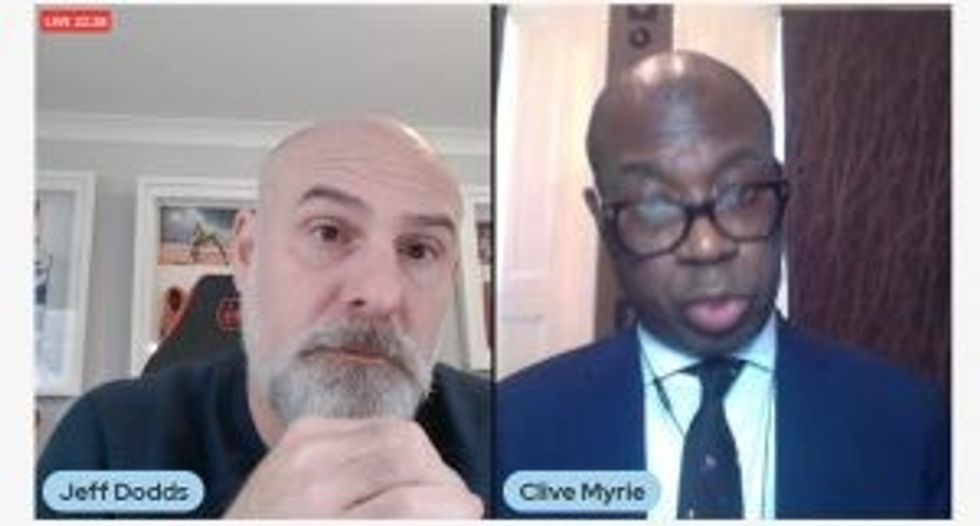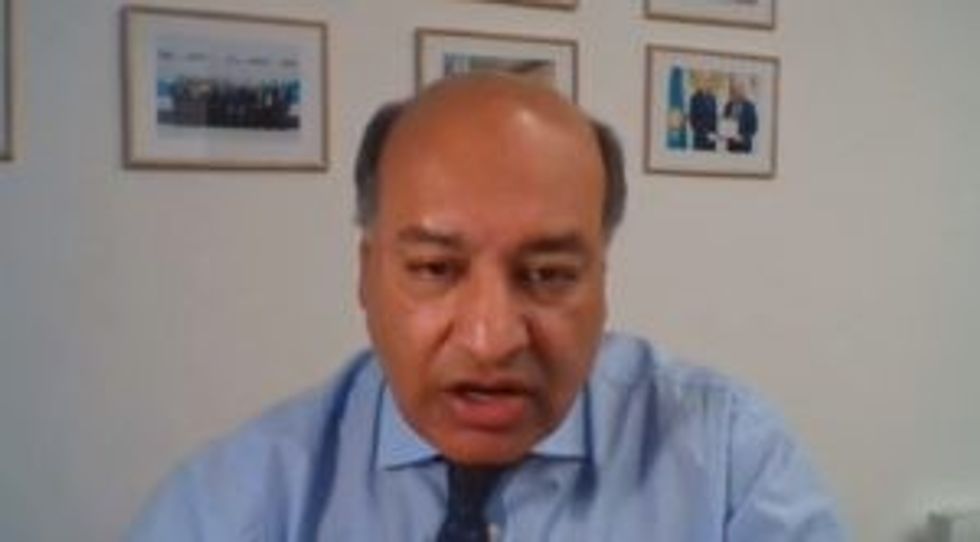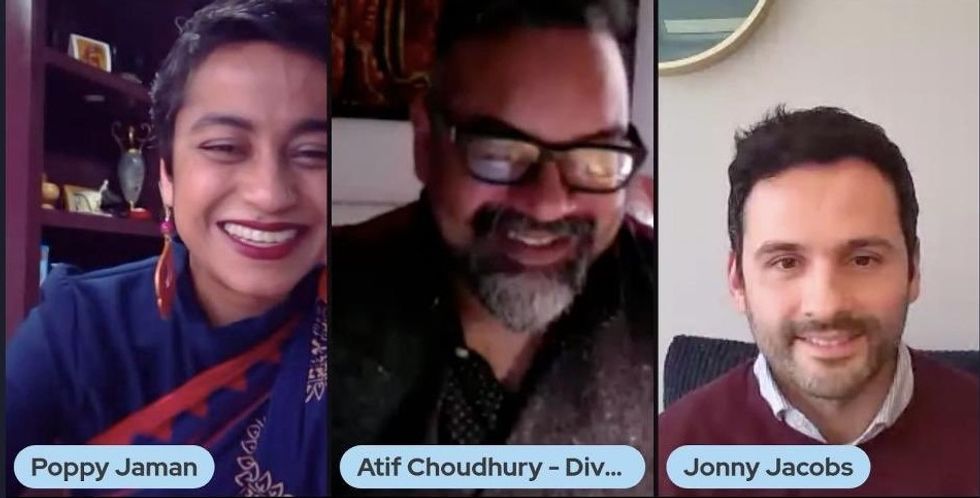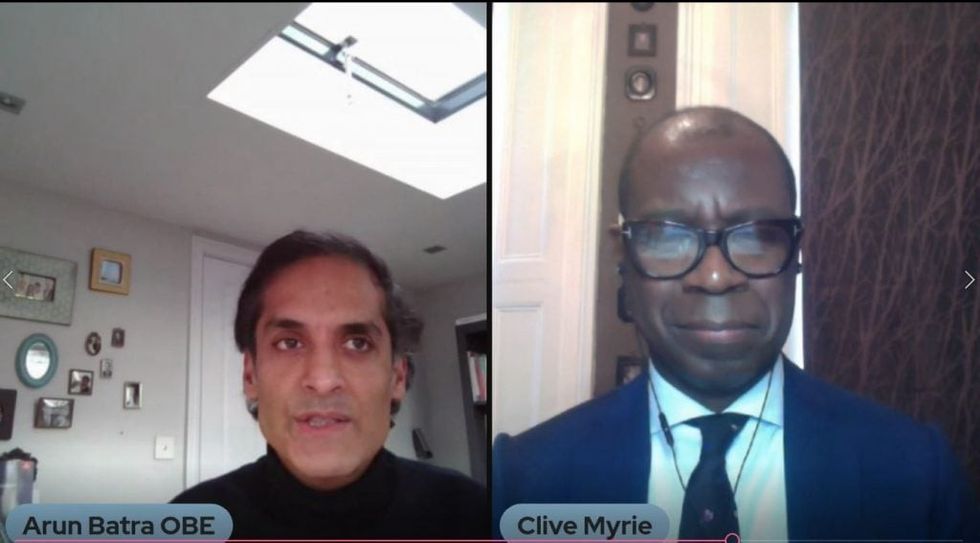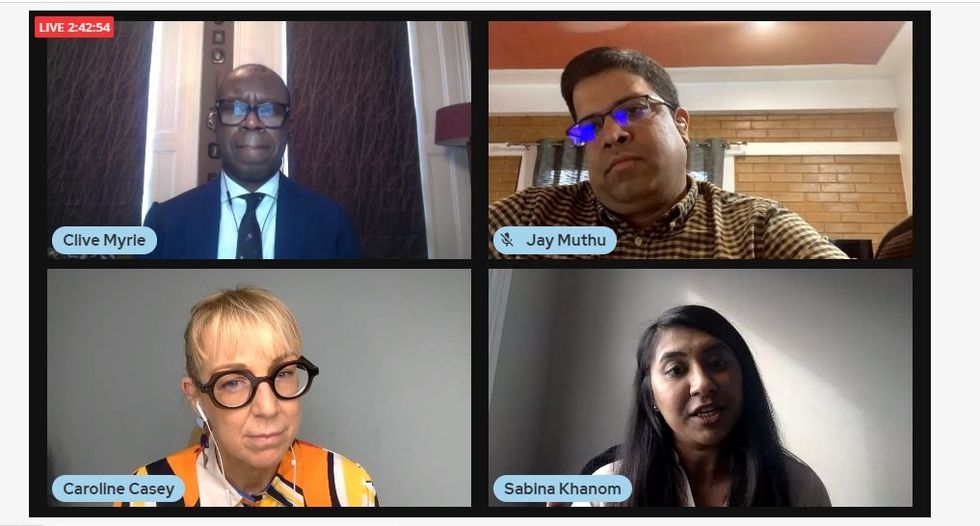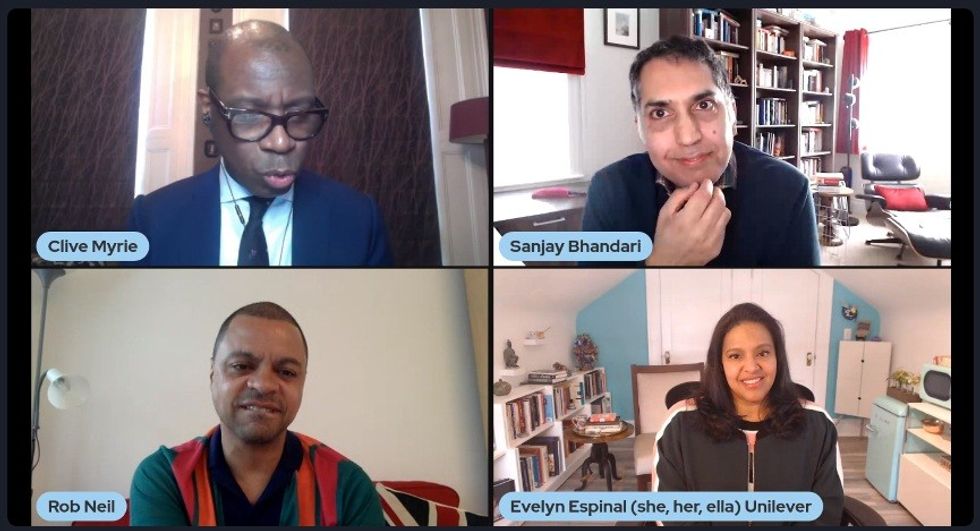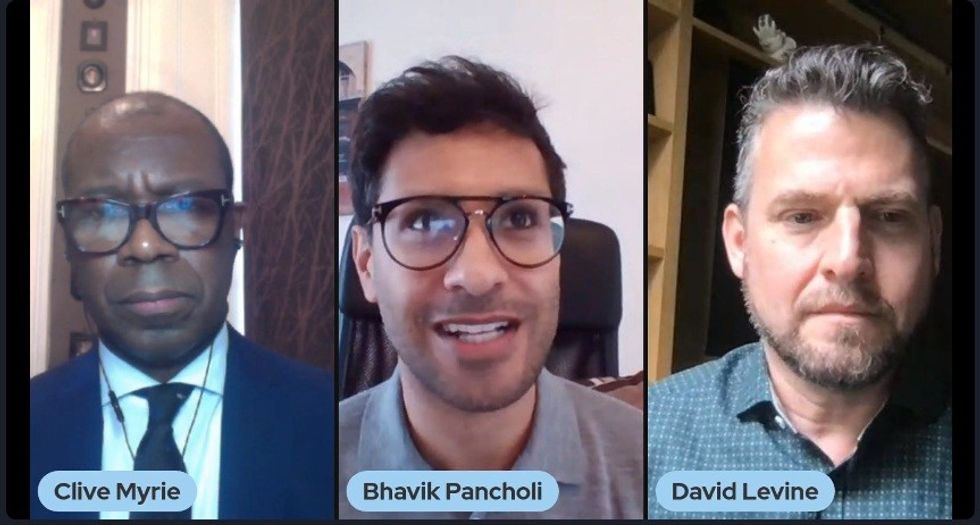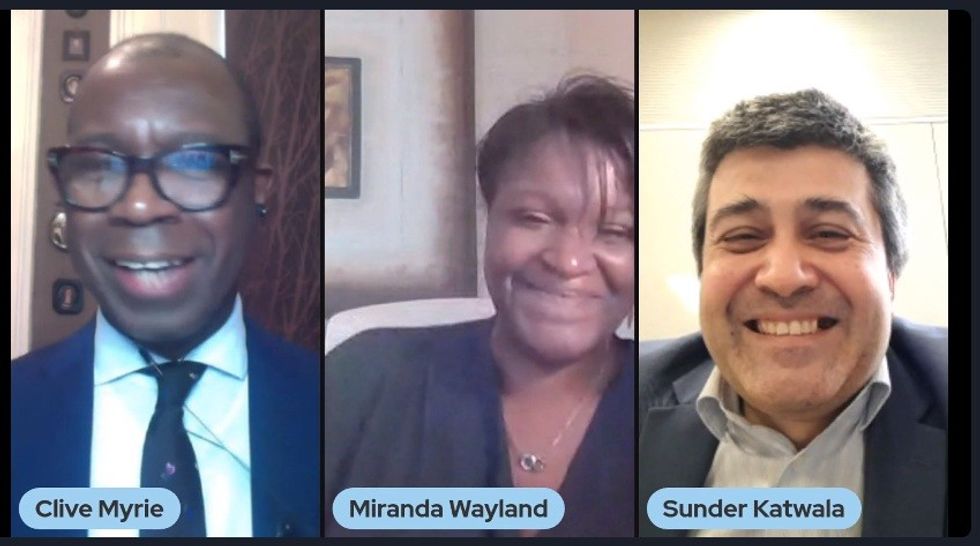THE GG2 Diversity Conference was held virtually for the first time last Wednesday (24), with a number of inspirational speakers, including campaigners, academics and senior executives, discussing a range of issues.
The event was hosted by the Asian Media Group (AMG), which publishes Eastern Eye, Garavi Gujarat, Asian Trader, Pharmacy Business, the Asian Rich List and the GG2 Power List.
The BBC presenter Clive Myrie hosted the conference where the theme was Empower for Change.
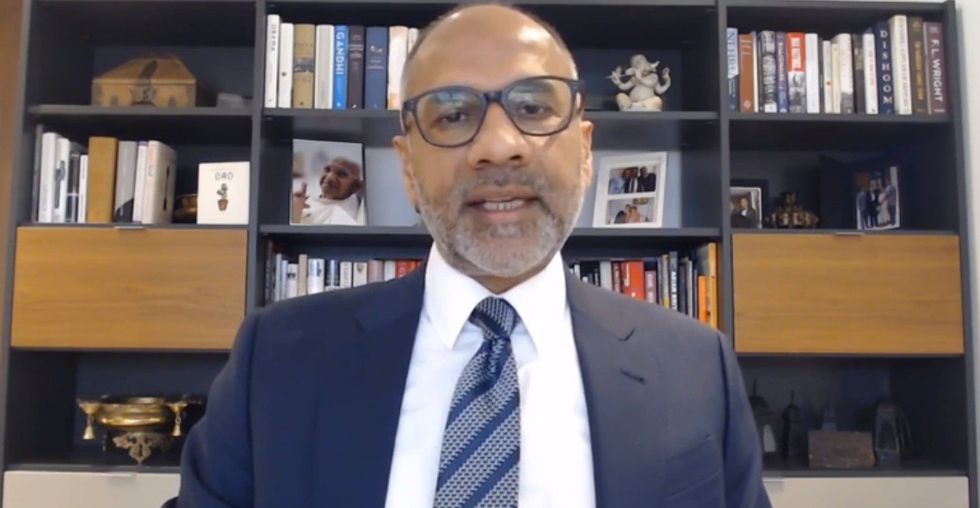
Welcoming guests, AMG’s executive editor Shailesh Solanki said the coronavirus pandemic’s disproportionate impact on ethnic minority communities had put “a sharp focus” on the effect of structural inequalities still existing in the UK. He also highlighted the lack of diverse representation within the most senior levels of society.
“While progress has been made, we have a long way to go to achieve equality in many areas of British life,” he said. “The stark reality is we still have too many white snowy peaks in key positions of power.”
_______________________________________________________
Virgin’s Collective effort
Keynote speech – Culture of Belonging: Jeff Dodds, chief operating officer, Virgin Media
A SENIOR Virgin Media executive has said the telecommunications company was committed to “accelerate change” to ensure there was representation at all employment levels.
During his keynote speech, Jeff Dodds also shared insights on ways that the organisation was attempting to promote an inclusive and welcoming working environment. Although he acknowledged diversity was still falling short in senior levels, Dodds said Virgin was committed to “accelerating that change”.
“From a resourcing point of view, we want to change the make-up of both the shortlist of candidates for roles, and also the make-up of people interviewing those candidates,” he said. “We know people tend to employ in their own image and therefore if we don’t have representative panels of people interviewing candidates, we could end up still not accelerating the change in profile at leadership level.”
Dodds spoke about initiatives recently implemented by the company to encourage equality and inclusivity. This included the Employee Voice Network, which aims to “give all employees a voice”. Launched last October, it is part of the ‘Belonging Collective’ – five employee networks representing under-represented ethnicities, gender, disability, neurodiversity, and LGBTQ+ communities, he said. These networks play a vital role in providing a safe space for employees to get involved in the Belonging movement, Dodds explained. The groups are open to all employees, so anyone can become an ally, as well as play an active role in the running of the network.
“The strategy is all about creating a culture where everyone can be their selves at work and people can achieve their potential,” Dodds said, adding: “Belonging and diversity of thought are drivers of commercial success.”
The organisation also aims to have a leadership team more representative of their customers. “(We have) real people who can articulate the personal voice of ethnic minorities,” Dodds said.
Virgin is also using more people of minority ethnicity in its advertising campaigns, he said. However, he admitted it was still an ongoing process of learning and recognising what needed to be done to create a safe, inclusive environment and eradicate discrimination.
“For us, every day is a school day so we recognise that we don’t know everything,” he said. “We encourage everyone in the company to take accountability for their own education. We do that by talking to each other in a safe environment to explore these issues, but we also work with a number of foundations, charities and experts to seek out the latest information.”
_______________________________________________________
Changing the status quo
My Journey: Sir Suma Chakrabarti, chairman, ODI (Overseas Development Institute)
SIR SUMA CHAKRABARTI has revealed his journey to the top ranks of the British civil service, saying his experience as a migrant helped him to relate to people in differing circumstances.
Previously the highest ranking Indian in the civil service, Sir Suma joined the government in 1984. His wide-ranging career has seen him serve as president of the European Bank for Reconstruction and Development; the permanent secretary to the Ministry of Justice; the clerk of the Crown in Chancery and permanent secretary of the Department for International Development.
Recalling his early childhood in India’s north Bengal, Sir Suma reflected on the struggles he and his family faced. His parents were in an inter-caste marriage – which was “highly unusual” at the time, he said. Although the family initially moved to the UK when Sir Suma was five years old so his father could study at Oxford University, they returned to Kolkata in 1969.
“The picture of acute poverty at the train station in Kolkata when we arrived is still with me today as a reminder of why I remain committed to economic and social change,” Sir Suma said.
However, the family encountered more challenges in India. A Maoist rebellion led to educational institutions being closed and Sir Suma did not go to school for six months. Eventually, his parents decided that he and his mother should return to London for his education. He learned how tough life was for his mother during that time. “She was effectively a lone parent, working full time, and shunned to some extent by her own community for being different to the norm,” he said. “I learned about courage and resilience from her.”
Sir Suma met his wife (who is Japanese) at Oxford University. When it came to deciding where they would settle permanently, Britain was the only place they both agreed on. “I changed my nationality to become a UK citizen at age 21,” he revealed. “Only then did I commit to a life in the UK.”
In his career in the civil service, Sir Suma said he experienced feelings of “imposter syndrome”. “It was evident in Whitehall meetings that some felt I had got these jobs not on merit, but because (former prime minister) Tony Blair had to meet his commitment to see more BAME civil servants in senior roles,” he recalled. “As many black and minority ethnic people will know from their own lives, we deal with these situations by working hard to show we are twice as good as any white rival.”
Noting the lessons he has learnt along the way, Sir Suma said feeling like “an insider and an outsider” has been advantageous as he was better able to relate to people with different life experiences.
Knowing the setting which best suits your leadership attributes and building teams with complementary skills have been additional life lessons, he added. “Never ever accept the status quo,” he said. “Act with others to change it.”
_____________________________________________________
‘Mental health matters’
Mental Health is Everyone’s Business: Poppy Jaman OBE, chief executive officer, City Mental Health Alliance and ambassador of Mental Health First Aid England; Atif Choudhury, co-founder and CEO, Diversity and Ability and Zaytoun CiC; and Jonny Jacobs, finance director at Starbucks UK
BUSINESS leaders should promote positive working environments which support good mental health, three mental health advocates said.
City Mental Health Alliance chief executive Poppy Jaman said senior leaders and line managers need to encourage employees to understand their own mental health. She referred to statistics provided by the NHS that showed up to 10 million people will need mental health support as a result of the coronavirus pandemic. Jaman said: “We need to convert as many white male leaders as we can on taking mental health seriously.”
According to Starbuck’s Jonny Jacobs, 90 per cent of people will not talk to their line manager about their mental health. “They think it is career limiting to talk about it,” he said, adding: “The finance community isn’t known for emotion, but we’re doing a lot to improve storytelling.”
Statistics have shown that one in four people in the UK will experience a mental health problem each year. Jacobs admitted struggling with his own mental wellbeing when he was growing up. “We all have (issues with) mental health and even I questioned my place on this earth when I was younger,” he said.
Co-founder and CEO of Diversity and Ability Atif Choudhury admitted he used to be reluctant to vocalise any issues he had with his mental health. “I would never have discussed this 10 years ago,” he said. “What else are people masking to the point it becomes a moral injury?”
_______________________________________________________
Diversity across the board
Myth of Meritocracy – Recruitment in the Pipeline: Arun Batra OBE, partner, EY
A SENIOR diversity and inclusion expert said innovation and bold leadership were needed for change when organisations wanted to improve their recruitment pipeline and better understand the challenges of meritocracy.
Arun Batra said an inclusive and representative workplace needed a number of factors, including improved data, global initiatives and cultural transformation. He also shared a number of future recommendations by the Parker Review. Batra is EY’s partner sponsor for the review into the ethnic diversity of UK boards.
“It should be deemed unacceptable that FTSE 350 companies should not engage constructively with reporting the ethnic diversity of their boards,” he said. “Companies should report fully on their ethnic diversity policies.”
Executive recruiters should be much more proactive in marketing highly talented ethnic candidates, he added.
Batra also touched upon nepotism, which he described as “rife” in business settings. “The more senior you are, the more likely you are to get a family member into the business,” he revealed.
_______________________________________________________
‘Inclusion has been a driving force throughout my life’
My Journey: Ashok Vaswani, CEO, consumer banking and payments, Barclays
ONE of the most senior Asians in banking has revealed how diversity and inclusion has played a part in his career path, calling them “driving forces throughout his life”.
Barclay’s Ashok Vaswani spoke of his early years growing up in India and his successful multi-national career in the banking industry.
Born and brought up in Bombay (now Mumbai), Vaswani revealed that he lost his father when he was six. With no siblings, he was brought up solely by his mother. “Whatever I am – good, bad or ugly – is because of my mom,” he said. “She was an incredible woman.”
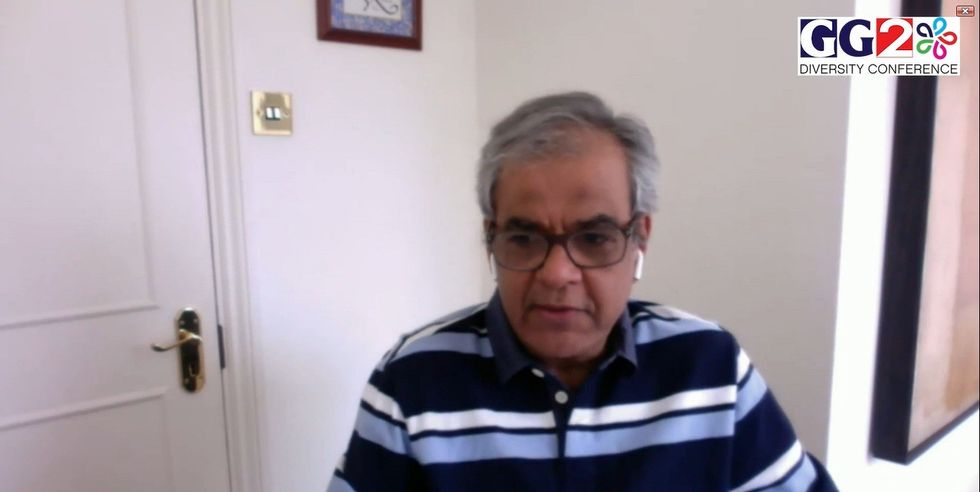
Education was very important to his mother. “I’m a double post-graduate student and right until her dying day, my mother thought I hadn’t studied enough,” he said. Calling himself “extremely lucky”, Vaswani said he joined the corporate world without a male role model in his life. “No one could have predicted that,” he said. “I joined the corporate world and I saw the world – and I mean that, literally.”
Roles in the finance industry, including a stint as the CEO, Asia Pacific of Citigroup, led him to travel and live all over the world. He began his career in Mumbai and has since worked and lived in Asia, Europe, the Middle East and the US.
“These companies afforded me the ability to move from place to place,” the London-based executive said. “They didn’t care if I was brown, black, tall or short… on merit and willing to get the job done, they encouraged me to go out there.”
He looked back on his international work life with fondness. “If I look back, my biggest accomplishment would be that if I went to any part of the world, someone would be willing to give up having dinner with their family and have dinner with me,” he said. “That is a very humbling experience, and a very humbling thought.”
Prior to his current role, Vaswani was the CEO for Barclays UK. He is a member of the Barclays Executive Committee and a board member for Pratham Board and the Trustee Board at Citizens Advice.
_______________________________________________________
Engaging with the disabled
Disability Inclusion and the Impact of Covid-19 on Disabled People and their Employment: Caroline Casey, founder, The Valuable 500; Jay Muthu, executive director for employee experience, Virgin Media; and Sabina Khanom, head of inclusion, Aviva
A DISABILITY panel has reflected upon the difficulties faced by disabled people during the coronavirus pandemic.
Caroline Casey, founder of the Valuable 500, noted the flexibility shown by employers during the ongoing pandemic, by allowing staff to work from home and reducing hours if needed.
“Covid-19 saw every business become flexible and make changes for employees – the world can’t unforget this,” Casey said. “This flexibility can and should be done for disabled employees too.” She added: “We’re not here today to point out all the things we’re not doing, but what we’re doing well. We need to focus on those cracks where the light gets in.”
Jay Muthu revealed his struggles during the pandemic. For instance, he found that staff at train stations were hesitant to help him with his wheelchair fearing they would catch Covid. “The government needs to support disabled people better during Covid,” Muthu said.
Muthu believes the conversation needs to be normalised, so disabilities become easier to talk about. Too many people do not know how to discuss it, he said. “Getting comfortable with the uncomfortable is what’s needed,” he added.
Disabled people are still marginalised in many parts of the world, he explained. “We continue to need to keep proving ourselves and get over the ‘imposter syndrome’,” he said. “Society believes we should be in a corner doing small things and not aiming for the skies.”
Casey added it was initially hard to accept her disability when the world was not designed for it. “I discovered that my biggest disability was not being blind, but the inches between my ears – what I thought about myself,” she admitted.
Meanwhile, Aviva’s head on inclusion, Sabina Khanom, spoke about the moves made by the insurance company to be more representative and encompassing. Although Aviva has “great disability policies”, Khanom said the biggest challenge was “implementing them through line managers”.
There are about 14 million people in the UK who live with a disability, figures have revealed.
_______________________________________________________
‘Acknowledge bias to make progress’
#BlackLivesMatter – Beyond the Hashtag: Rob Neil OBE, director, Krystal Alliance; Evelyn Espina, global VP Equity, Diversity and Inclusion, Unilever; and Sanjay Bhandari, chairman, Kick It Out
THE discrimination faced by ethnic minorities in history should be acknowledged, otherwise “we will not be able to move forward”, three senior executives said in a panel on the Black Lives Matter (BLM) movement.
Rob Neil said there was a lack of education about the truth behind the slave trade and the civil rights movement in the US, arguing society had “to face up to it and repent”, otherwise progress will not be made. “Not everything that is faced can be changed, but nothing can be changed until it is faced,” Neil said, quoting activist James Baldwin.
Evelyn Espina added: “If we don’t know our history, we are doomed to repeat it.”
The multinational consumer goods company with a product portfolio such as Ben & Jerry’s and Dove wanted all brands to be “purpose driven”. “We want them to connect with people around issues that are important to them,” she said, noting Ben & Jerry’s latest campaigns which have supported the BLM movement.
Sanjay Bhandari, chairman of Kick It Out, spoke about the lack of Asian representation in football. “Out of 4,000 professional football players in the UK, you don’t see a single one who looks like me,” he said. “There’s a big difference between the B and the A in BAME.”
He added that industry bosses were not only looking at representation on the pitch, but also in senior leadership roles.
_______________________________________________________
Empathy and being an ally
Breaking the Taboo and Supporting the LGBTQ+ Community: Bhavik Pancholi, diversity and inclusion specialist; and David Levine, head of studio, Moonbug Entertainment.
BEING empathetic to the LGBTQ+ experience creates better allyship in working environments, a professional has said.
During a session on supporting the community, diversity specialist Bhavik Pancholi and Moonbug Entertainment’s David Levine explored the importance of role models, networks and safe spaces.
On what it means to be an ally, Levine said: “When people begin to understand what the LGBTQ+ journey is like, they can be better allies.”
Pancholi revealed his ambitions to ensure all workplaces provided “safe spaces” for LGBTQ+ employees. “I want to talk to organisations on how they can create those spaces so people can be their whole selves at work,” he said.
“My dad was disappointed I hadn’t felt able to talk about it for 20 years,” he said. “They told me I was their son before I came out to them, and would be their son today, tomorrow and forever.”
However, Pancholi feels the ‘coming out’ process is constantly repeated. “You don’t just come out the one time,” he said. “Whether it is telling a new client or a new friend, we have to repeat the process of coming out again and again.”
_______________________________________________________
What BAME represents
Race, Identity and Defining the Term BAME: Miranda Wayland, diversity manager, BBC; and Sunder Katwala, director, British Future
A THIRD of people are not aware of the term BAME (black, Asian and minority ethnic – the acronym that is used to describe anyone who is not white British), a poll has revealed.
The results were confirmed by British Future director Sunder Katwala, who added that only 40 per cent of respondents felt confident knowing exactly what the acronym means.
Although the BBC’s Miranda Wayland said there was “safety” in using the term, she stressed the powerful nature of language. “(Language) can divide or unite,” she said, adding: “The acronym has a profound detriment to some when we’re putting so many groups together.”
Wayland’s role in the BBC is to champion diversity in the creative community and work with key industry stakeholders to deliver the broadcaster’s onscreen diversity ambitions. Reflecting on the lack of visibility of under-represented groups in the industry, she said: “We often don’t give ethnic minority groups the chance to fail as they have to work twice as hard. But when we do fail, that’s when we really learn. Under-represented groups therefore struggle to be seen and heard.”
She also referred to recent BBC shows I May Destroy You and A Suitable Boy, fronted by black and Asian casts, respectively, which had been well received by critics and audiences alike.
“We told stories from the black and Asian perspectives, but they were still enjoyed by so many other ethnic groups,” she noted.
